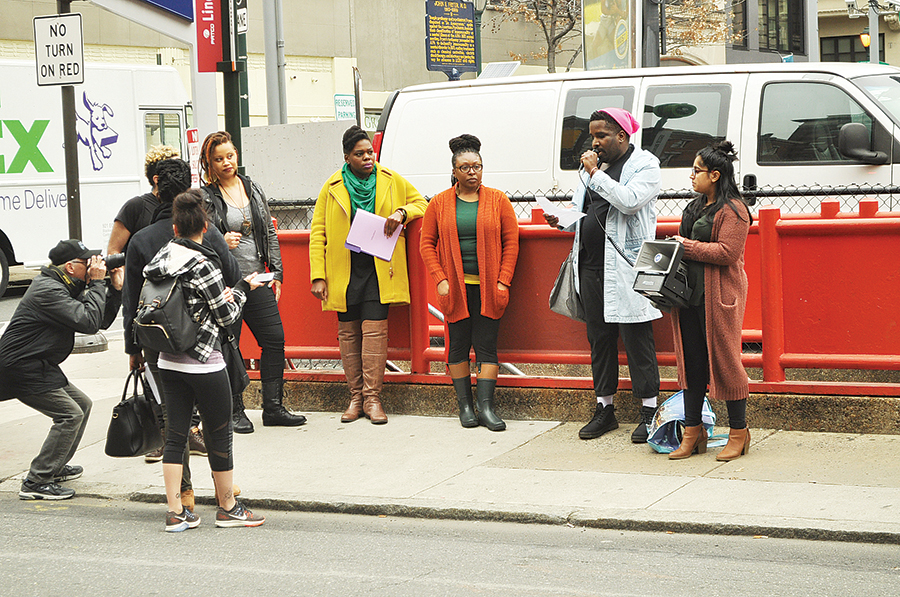Representatives from Philadelphia FIGHT, an HIV/AIDS-services nonprofit, last week met with the Philadelphia Commission on Human Relations. Members of the nonprofit’s board and staff aimed to discuss its status on PCHR’s report on Gayborhood racism.
FIGHT was among the organizations named in the commission’s January 2017 report, “Inform, Monitor, Enforce: Addressing Racism and Discrimination in Philadelphia’s LGBTQ Community.” This report stemmed from an October 2016 public hearing during which community members relayed experiences with racism and discrimination in the Gayborhood.
In the report, the agency mandated that FIGHT undergo racial-bias and sensitivity training. While the nonprofit complied, representatives believe FIGHT should be removed from the report, calling it “outdated” since FIGHT “improved” one year later.
PCHR spokesperson Rachel Hooper confirmed to PGN in a statement that the agency’s leadership met with four representatives from FIGHT on March 1.
“FIGHT’s initial requests were that we take down our January 2017 report on racism and discrimination in the LGBTQ community from our website, and that we tour their organization’s operations. We informed them that we stand by our report, which is a product of many community voices through our public-hearing process and other submitted testimony. The report will remain on our website, along with our subsequent October 2017 progress report, which shows full compliance by FIGHT. In the near future, Rue Landau and PCHR leadership will tour Philadelphia FIGHT, along with Amber Hikes, Director of the Office of LGBT Affairs. The PCHR is a neutral agency charged with enforcing the city’s Fair Practices Ordinance and conducting unbiased investigations on all complaints of discrimination.”
A FIGHT spokesperson declined to provide details about the meeting.
Meanwhile, on the corner of 13th and Locust streets, members of the Black and Brown Workers Cooperative spoke out against the nonprofit.
Members have accused FIGHT of lacking equity, safety and fairness in the workplace and in the organization’s policies.
BBWC cofounder Abdul-Aliy Muhammad said the group is demanding a change in FIGHT’s leadership.
“We are standing with former and current Philadelphia FIGHT staff,” they said. “To FIGHT workers and patients who are organizing, we see you, we salute you. Most of the services at Philadelphia FIGHT centers on HIV-positive communities and is overwhelmingly representative of formerly incarcerated people. As an HIV-positive organizer, I am alarmed by the actions of FIGHT senior leadership, especially Jane Shull.”
Muhammad said claims that BBWC wanted to shut down FIGHT were false.
“When we, the Black and Brown Workers Cooperative, and our coalition partners heard the narrative being spun by the leadership of FIGHT — that we wanted FIGHT’s doors to close — we were appalled and upset. Why would a worker’s-rights organization, who works directly with black and brown populations, want to close an AIDS-service organization? That’s not true. That’s a lie.
“This is fear-mongering. Due to intimidation, retaliation and fear of job loss, many workers within this institution are unable to be visible in ways we can be as a coalition, and we fully support workers doing what they need to do to survive within these systems.”
Dominique London read a statement on behalf of West Philadelphia Community Health Workers.
“We declare as workers in the field of community health that we stand in solidarity and without obstruction in support of the staff of Philadelphia FIGHT, who endure and resist institutional racism and oppressive systems within the workplace,” London said.
“We know very well that nonprofit health-care organizations that fail to empower, amplify and show respect and dignity to black and brown workers equally fail to provide quality care to the populations they serve.”
Muhammad also said that FIGHT’s policies impact black women.
“We declare and agree that the leadership of Philadelphia FIGHT has created and enforced a violent workplace that currently disproportionately and adversely impacts black women — both cisgender and transgender women — in the following ways: excluding black frontline staff and middle-management staff from decision-making processes; black women are seen, treated and targeted as the ‘angry black woman’ for challenging racialized policies and practices [and] power-abuse nepotism,” said Muhammad.
“[Human Resources] is used as a tool of control and surveillance instead of existing as a neutral body to assist workers in addressing grievances,” they added.
According to a press release, BBWC crafted a list of demands for the nonprofit with support from Act Up Philadelphia, The Womanist Working Collective and a group of workers from a West Philadelphia Federally Qualified Health Center.
In addition to Shull, BBWC and allies also demanded the immediate resignation of FIGHT medical director Karam Mounzer. And they asked for a worker-led selection of a new executive director, as well as permitting the workers to vote out the new leader and restart the hiring process if practices are in question.
Additionally, they demanded training on responsibility and roles of all current and future members of the organization’s board of directors; routine evaluation and assessment of active board members; and the creation of training and evaluation of materials for all staff.
The group also asked for an updated employee handbook with transparency, strict execution of protocols, anti-oppression training, an audit of Philadelphia FIGHT by a third party, and mediation to avoid intimidation and lack of safety by Human Resources.
BBWC also imposed a March 14 deadline for a response to its demands.

